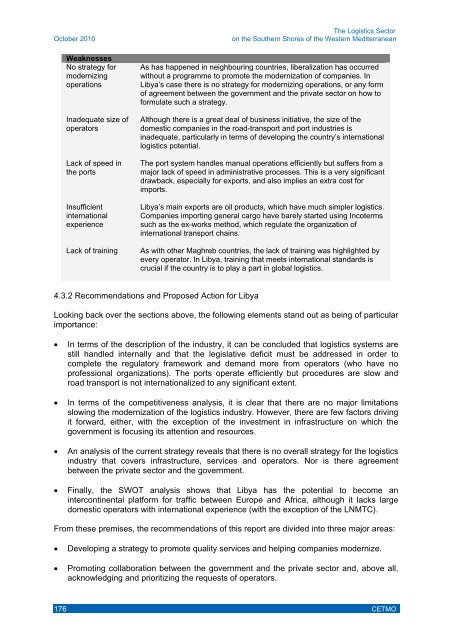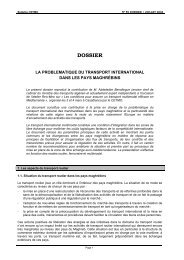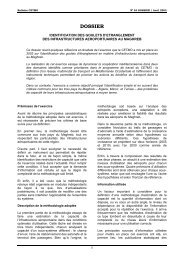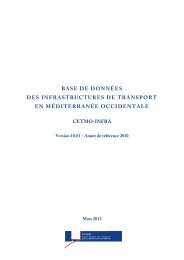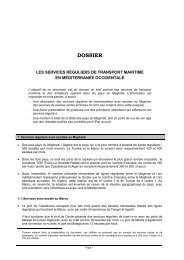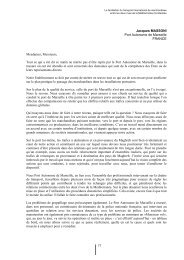The Logistics Sector on the Southern Shores of the Western ... - cetmo
The Logistics Sector on the Southern Shores of the Western ... - cetmo
The Logistics Sector on the Southern Shores of the Western ... - cetmo
- No tags were found...
Create successful ePaper yourself
Turn your PDF publications into a flip-book with our unique Google optimized e-Paper software.
October 2010WeaknessesNo strategy formodernizingoperati<strong>on</strong>sInadequate size <strong>of</strong>operatorsLack <strong>of</strong> speed in<strong>the</strong> portsInsufficientinternati<strong>on</strong>alexperienceLack <strong>of</strong> training<str<strong>on</strong>g>The</str<strong>on</strong>g> <str<strong>on</strong>g>Logistics</str<strong>on</strong>g> <str<strong>on</strong>g>Sector</str<strong>on</strong>g><strong>on</strong> <strong>the</strong> Sou<strong>the</strong>rn <strong>Shores</strong> <strong>of</strong> <strong>the</strong> <strong>Western</strong> MediterraneanAs has happened in neighbouring countries, liberalizati<strong>on</strong> has occurredwithout a programme to promote <strong>the</strong> modernizati<strong>on</strong> <strong>of</strong> companies. InLibya’s case <strong>the</strong>re is no strategy for modernizing operati<strong>on</strong>s, or any form<strong>of</strong> agreement between <strong>the</strong> government and <strong>the</strong> private sector <strong>on</strong> how t<strong>of</strong>ormulate such a strategy.Although <strong>the</strong>re is a great deal <strong>of</strong> business initiative, <strong>the</strong> size <strong>of</strong> <strong>the</strong>domestic companies in <strong>the</strong> road-transport and port industries isinadequate, particularly in terms <strong>of</strong> developing <strong>the</strong> country’s internati<strong>on</strong>allogistics potential.<str<strong>on</strong>g>The</str<strong>on</strong>g> port system handles manual operati<strong>on</strong>s efficiently but suffers from amajor lack <strong>of</strong> speed in administrative processes. This is a very significantdrawback, especially for exports, and also implies an extra cost forimports.Libya’s main exports are oil products, which have much simpler logistics.Companies importing general cargo have barely started using Incotermssuch as <strong>the</strong> ex-works method, which regulate <strong>the</strong> organizati<strong>on</strong> <strong>of</strong>internati<strong>on</strong>al transport chains.As with o<strong>the</strong>r Maghreb countries, <strong>the</strong> lack <strong>of</strong> training was highlighted byevery operator. In Libya, training that meets internati<strong>on</strong>al standards iscrucial if <strong>the</strong> country is to play a part in global logistics.4.3.2 Recommendati<strong>on</strong>s and Proposed Acti<strong>on</strong> for LibyaLooking back over <strong>the</strong> secti<strong>on</strong>s above, <strong>the</strong> following elements stand out as being <strong>of</strong> particularimportance:• In terms <strong>of</strong> <strong>the</strong> descripti<strong>on</strong> <strong>of</strong> <strong>the</strong> industry, it can be c<strong>on</strong>cluded that logistics systems arestill handled internally and that <strong>the</strong> legislative deficit must be addressed in order tocomplete <strong>the</strong> regulatory framework and demand more from operators (who have nopr<strong>of</strong>essi<strong>on</strong>al organizati<strong>on</strong>s). <str<strong>on</strong>g>The</str<strong>on</strong>g> ports operate efficiently but procedures are slow androad transport is not internati<strong>on</strong>alized to any significant extent.• In terms <strong>of</strong> <strong>the</strong> competitiveness analysis, it is clear that <strong>the</strong>re are no major limitati<strong>on</strong>sslowing <strong>the</strong> modernizati<strong>on</strong> <strong>of</strong> <strong>the</strong> logistics industry. However, <strong>the</strong>re are few factors drivingit forward, ei<strong>the</strong>r, with <strong>the</strong> excepti<strong>on</strong> <strong>of</strong> <strong>the</strong> investment in infrastructure <strong>on</strong> which <strong>the</strong>government is focusing its attenti<strong>on</strong> and resources.• An analysis <strong>of</strong> <strong>the</strong> current strategy reveals that <strong>the</strong>re is no overall strategy for <strong>the</strong> logisticsindustry that covers infrastructure, services and operators. Nor is <strong>the</strong>re agreementbetween <strong>the</strong> private sector and <strong>the</strong> government.• Finally, <strong>the</strong> SWOT analysis shows that Libya has <strong>the</strong> potential to become aninterc<strong>on</strong>tinental platform for traffic between Europe and Africa, although it lacks largedomestic operators with internati<strong>on</strong>al experience (with <strong>the</strong> excepti<strong>on</strong> <strong>of</strong> <strong>the</strong> LNMTC).From <strong>the</strong>se premises, <strong>the</strong> recommendati<strong>on</strong>s <strong>of</strong> this report are divided into three major areas:• Developing a strategy to promote quality services and helping companies modernize.• Promoting collaborati<strong>on</strong> between <strong>the</strong> government and <strong>the</strong> private sector and, above all,acknowledging and prioritizing <strong>the</strong> requests <strong>of</strong> operators.176 CETMO


